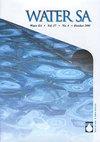Prevalence of free-living acanthamoeba and its associated bacteria in energy-efficient hot water systems in South Africa
IF 1.2
4区 环境科学与生态学
Q4 WATER RESOURCES
引用次数: 0
Abstract
As part of the Eskom rebate programme, energy-efficient hot water systems such as solar water heaters (low pressure), heat pumps and energy-efficient showerheads were rolled out to the public as a measure to conserve and save energy. There has been a concern that these systems may not reach the required high temperatures, especially during winter, and, as a result of this, Acanthamoeba and its associated bacteria such as Legionella pneumophila, Pseudomonas aeruginosa and nontuberculous mycobacteria could flourish within these systems causing a potential health risk to consumers. This study examined the relationship between Acanthamoeba and its associated bacteria at different temperature ranges. A total of 156 water (69) and biofilm samples (87) were collected from a solar water heater, heat pump, geyser and showerheads and examined for these organisms using amoebal enrichment and molecular techniques. Amoeba could be cultivated from 45 (65.2%) of the water samples and 56 (64.4%) of the biofilm samples. The study confirmed the presence of Legionella pneumophila, Pseudomonas aeruginosa and nontuberculous mycobacteria in the hot water systems at both of the simulated winter (20°C to 30°C) and higher summer (40°C to 55°C) temperatures as well as the control system. There was a significant positive correlation between the presence of Acanthamoeba and the presence of Pseudomonas. Based on this association it is suggested that Pseudomonas aeruginosa could be investigated as an indicator organism for the presence of Acanthamoeba and opportunistic pathogens.自由生活棘阿米巴及其相关细菌在南非节能热水系统中的流行
作为Eskom回扣计划的一部分,节能热水系统,如太阳能热水器(低压)、热泵和节能淋浴喷头,作为节约和节约能源的措施向公众推出。人们一直担心这些系统可能达不到所需的高温,特别是在冬季,因此,棘阿米巴及其相关细菌,如嗜肺军团菌、铜绿假单胞菌和非结核分枝杆菌可能在这些系统中繁殖,对消费者造成潜在的健康风险。本研究考察了棘阿米巴及其伴生细菌在不同温度范围内的关系。从太阳能热水器、热泵、间歇泉和淋浴喷头中收集了156个水(69个)和生物膜样本(87个),并使用阿米巴原虫富集和分子技术检测了这些生物。水样45份(65.2%)、生物膜56份(64.4%)可培养出变形虫。该研究证实,在模拟冬季(20°C至30°C)和较高夏季(40°C至55°C)温度的热水系统以及控制系统中均存在嗜肺军团菌、铜绿假单胞菌和非结核分枝杆菌。棘阿米巴的存在与假单胞菌的存在呈显著正相关。基于这种关联,建议铜绿假单胞菌可以作为棘阿米巴和条件致病菌存在的指示生物进行研究。
本文章由计算机程序翻译,如有差异,请以英文原文为准。
求助全文
约1分钟内获得全文
求助全文
来源期刊

Water SA
环境科学-水资源
CiteScore
2.80
自引率
6.70%
发文量
46
审稿时长
18-36 weeks
期刊介绍:
WaterSA publishes refereed, original work in all branches of water science, technology and engineering. This includes water resources development; the hydrological cycle; surface hydrology; geohydrology and hydrometeorology; limnology; salinisation; treatment and management of municipal and industrial water and wastewater; treatment and disposal of sewage sludge; environmental pollution control; water quality and treatment; aquaculture in terms of its impact on the water resource; agricultural water science; etc.
Water SA is the WRC’s accredited scientific journal which contains original research articles and review articles on all aspects of water science, technology, engineering and policy. Water SA has been in publication since 1975 and includes articles from both local and international authors. The journal is issued quarterly (4 editions per year).
 求助内容:
求助内容: 应助结果提醒方式:
应助结果提醒方式:


